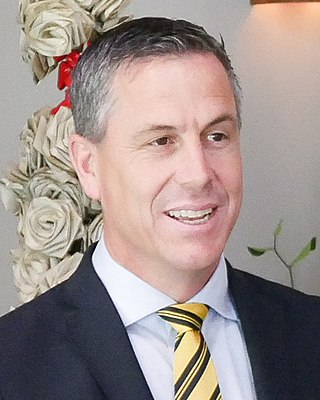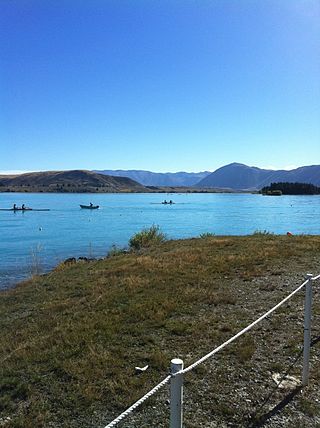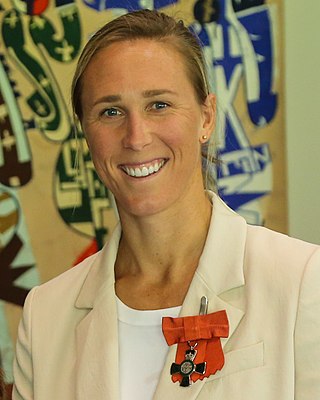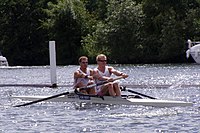
Robert Norman Waddell is a New Zealand Olympic Gold Medalist and double World Champion Single sculler rower, and America's Cup yachtsman. He is a triple New Zealand Supreme 'Halberg Awards' Sportsperson of the year winner, 1998 to 2000. He holds the third fastest 2000 metre indoor rowing machine time in the world, clocking a time of 5 mins 36.6 secs (5:36.6), which was the previous world record for 19 years before the time was improved by Joshua Dunkley-Smith. He also held the record for 5000m on the rowing machine with a time of 14min 58sec. This made him the first person to go below 15 min for this distance. He holds a black belt in judo. He played rugby union for Waikato. Waddell was Chef de Mission of the 2014 and 2018 New Zealand Commonwealth Games teams, and the 2016 and 2020 Summer Olympics.

Lake Ruataniwha is an artificial lake in the Mackenzie Basin in the South Island of New Zealand. It was formed in 1977–1981 as part of the Waitaki hydroelectric project. It lies on the traditional boundary of the Canterbury and Otago provinces, with the town of Twizel two kilometres to the north.
The Maadi Cup is the prize for the New Zealand Secondary Schools Boys' Under 18 Rowing Eights. More colloquially, it is the name given to the New Zealand Secondary Schools Rowing Regatta, at which the Maadi Cup is raced. The regatta is the largest school sports event in the Southern Hemisphere, with over 2,087 rowers from 113 secondary schools participating in 2023 The regatta is held annually in late March, alternating between the country's two main rowing venues: Lake Karapiro near Cambridge, and Lake Ruataniwha near Twizel.

Alexander Mahé Owens Drysdale is a New Zealand politician and retired rower. Drysdale is a two-time Olympic champion and a five-time world champion in the single sculls. He is a seven-time New Zealand national champion and five-time recipient of New Zealand Sportsman of the Year. He is the mayor-elect of Tauranga.
Richard William Tonks is a former national New Zealand rowing coach and a former rower who won a silver medal at the 1972 Summer Olympics in Munich. Through his coaching career he has coached crews to a total of 25 World Championship medals—including thirteen gold—and a total of seven Olympic medals—six of which were gold.

Kaspar Taimsoo is an Estonian rower. He is a four time Olympian and four time European champion. He is a member of Viljandi Rowing Club.

Eric Gordon Murray is a retired New Zealand rower and gold medalist at the 2012 London Olympic Games, as well as at the 2016 Rio de Janeiro Olympic Games. He won six consecutive World Rowing Championship gold medals in the coxless pair plus two other gold medals in the coxless four and coxed pair. In 2012 an 2014 he set two world best times in the coxless pair and coxed pair respectively, which as of 2021 still stand as the world's best in those boat classes.

Rebecca Scown is a professional rower from New Zealand. Together with Juliette Haigh, she won the bronze medal in the women's coxless pair at the 2012 Summer Olympics. Previously they had won gold in the women's pair at the World Rowing Cup regatta in Lucerne, 2010 and at the 2010 World Rowing Championships at Lake Karapiro and the 2011 World Rowing Championships in Bled. After winning a bronze medal with the New Zealand women's eight at the 2017 World Rowing Championships, she is having a break from rowing in the 2017/18 season.

Peter Taylor is a former New Zealand rower. He became world champion in 2009 in men's lightweight double scull.

Emma Kimberley Twigg is a New Zealand rower. A single sculler, she was the 2014 world champion and won gold in her fourth Olympics in Tokyo in July 2021. Previous Olympic appearances were in 2008, 2012, and 2016. She has retired from rowing twice, first for master-level studies in Europe in 2015 and then after the 2016 Olympics, disappointed at having narrowly missed an Olympic medal for the second time. After two years off the water, she started training again in 2018 and won silver at the 2019 World Rowing Championships. Since her marriage in 2020, she has become an outspoken advocate for LGBT athletes. At the 2020 Summer Olympics, Twigg won gold in the woman's single scull. At the 2024 Summer Olympics, Twigg won Silver in the same event.

Nathan Phillip Cohen is a New Zealand rower. He is a two-time world champion, and won a gold medal in the Olympics. In 2006, rowing a single scull, he won a gold medal at the World University Games. In doing so, he became the first New Zealander to win a gold medal at the World University Games in any sport. Cohen and his rowing partner, Joseph Sullivan, won back-to-back gold medals in the men's double sculls at both the 2010 and 2011 World Rowing Championships. At the 2012 Summer Olympics, he and his partner won the gold medal in the men's double sculls, after breaking the Olympic best time in the heats. In 2013, Cohen was made a Member of the New Zealand Order of Merit for his services to rowing.

Joseph Sullivan is a New Zealand rower.

Eve Macfarlane is a New Zealand rower. Described as a "natural rower", she went to the 2009 World Rowing Junior Championships within a few months of having taken up rowing and won a silver medal. She represented New Zealand at the 2012 Summer Olympics in London as the country's youngest Olympian at those games. She was the 2015 world champion in the women's double sculls with Zoe Stevenson. At the 2016 Summer Olympics, they came fourth in the semi-finals and thus missed the A final.

Grace Elizabeth Prendergast is a former New Zealand sweep rower. She is a 15-time national champion in the premier category, an Olympic champion, a five-time world champion and the current (2022) world champion in the coxless pair. She grew up in Christchurch, where she started rowing for the Avon Rowing Club in 2007. She competed at the Tokyo Olympics in two boat classes and won gold in the coxless pair and a silver in the eight and set a new world's best time in the pair. Various parties, including the World Rowing Federation, expected her to win medals in Tokyo. She was the highest ranked female rower in the world twice in a row in 2019 and 2021. Since 2014, her rowing partner in the coxless pair has been Kerri Gowler. Prendergast is also a Boat Race winner, having competed as part of Cambridge University Boat Club's (CUBC) women's crew in 2022. She retired from professional rowing in October 2022.

Zoe McBride is a former New Zealand rower. She is a double world champion in the women's lightweight single scull. She is only the second New Zealand rower to win a double national championship in both the lightweight and premier single sculls.
Ruby Tew is a New Zealand Olympic rower.
Georgia Perry is a New Zealand rower.
Kelsi Walters is a New Zealand rower.
Phoebe Spoors is a New Zealand rower. From Christchurch, she was an unused reserve in the New Zealand women's eight at the 2020 Tokyo Olympics in which her elder sister Lucy won a silver medal. In an unusual career progression for a New Zealand rower, she never represented the country as an age-group rower but joined the national team after several years in the United States for fulltime rowing at the University of Washington combined with tertiary study.
Kirstyn Moana Goodger is a New Zealand rower. Originally from Auckland and now based in Cambridge, she took up rowing in 2005. She has won one international medal for New Zealand – a silver at the 2009 World Rowing Junior Championships in France. From 2011 to 2014, she rowed for the Washington Huskies while studying oceanography at the University of Washington. Upon her return to New Zealand, she joined the Wairau Rowing Club and is one of the premier rowers who belongs to the Central Rowing Performance Centre. Goodger has been an elite rower for the national squad since 2017. She has represented her country at several World Rowing Cups, the 2017 and the 2019 World Rowing Championships. At the latter regatta, she managed to qualify the women's quad scull boat category for the 2020 Tokyo Olympics. She was chosen as one of ten rowers for the New Zealand women's eight and travelled to the Games with the team. The woman's eight squad would come away with a silver medal in the eight at the 2020 games. Goodger has won four premier national titles in the women's eight. She worked as a scientist and engineer for consultancy Beca in their ports and coastal team.
















